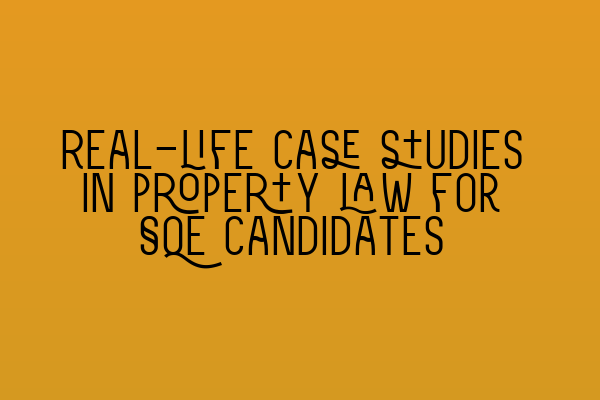Real-Life Case Studies in Property Law for SQE Candidates
As a SQE candidate preparing for the Property Law and Land Law assessments, you need to develop a comprehensive understanding of the subject matter. One of the most effective ways to grasp complex legal concepts is by exploring real-life case studies. By analyzing actual cases, you can apply theoretical knowledge to practical scenarios and enhance your problem-solving skills.
In this blog post, we will delve into some intriguing and instructive property law case studies that will help you in your SQE preparation. By examining these cases, you will gain insights into the application of property law principles and learn how to approach similar scenarios during the SQE assessments.
1. Smith v. Jones: Boundary Disputes and Adverse Possession
Case Background: In this case, Mr. Smith and Mr. Jones were neighboring property owners. However, a dispute arose regarding the exact location of their common boundary line. Both parties claimed ownership of a strip of land between their properties. The key legal issue was whether adverse possession principles could determine the boundary.
Case Analysis: This case highlights the importance of understanding boundary disputes and adverse possession. Adverse possession allows individuals who have occupied land for a significant period of time without the owner’s objection to claim legal ownership. By studying the legal arguments and final judgment in Smith v. Jones, you can gain valuable insights into how adverse possession can affect boundary disputes.
Related Articles:
2. Brown v. Green: Leasehold Enfranchisement and Tenant’s Rights
Case Background: Brown, a long-term leaseholder, sought to exercise their right to enfranchise their leasehold property. Green, the freehold owner, disputed Brown’s entitlement to enfranchisement, leading to a legal battle centered around the interpretation of leasehold enfranchisement legislation and tenant’s rights.
Case Analysis: Understanding leasehold enfranchisement is crucial in property law. This case study allows you to explore the complexities of tenant’s rights and the process of enfranchising leasehold properties. By analyzing the legal arguments, court decisions, and implications of Brown v. Green, you can develop a comprehensive understanding of leasehold enfranchisement principles.
Related Articles:
3. Wilson v. Thompson: Easements and Right of Way Disputes
Case Background: Wilson and Thompson were neighboring property owners, with Wilson seeking a right of way through Thompson’s property to access a nearby road. Thompson denied Wilson’s request, leading to a legal battle over easements and right of way. The key issue was whether Wilson had a valid legal right to cross Thompson’s property.
Case Analysis: This case study focuses on easements and the interpretation of right of way in property law. Understanding how easements are established and the limits of a property owner’s rights regarding access is essential for SQE candidates. By examining the arguments and court decisions in Wilson v. Thompson, you can enhance your understanding of easement principles and their application in real-life scenarios.
Related Article:
Conclusion
Studying real-life case studies is an effective way to deepen your understanding of property law and prepare for the SQE assessments. By analyzing the legal issues, arguments, and court decisions in cases such as Smith v. Jones, Brown v. Green, and Wilson v. Thompson, you can gain valuable insights into the application of property law principles in practical scenarios.
Remember to regularly practice SQE exam questions and take advantage of SQE preparation courses to further enhance your knowledge and skills in property law. By combining theoretical knowledge with practical case analysis, you will be well-equipped to tackle the Property Law and Land Law assessments with confidence.
